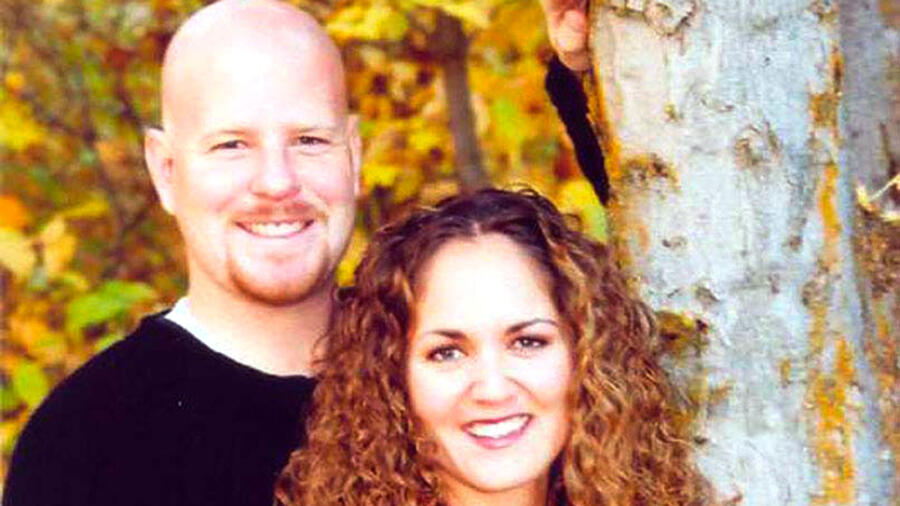The Last Night of a Beautiful Life
On a summer night in 2004, Lori Kay Soares Hacking was making plans for a new life. The 27-year-old was five weeks pregnant, packing up her dreams to follow her husband, Mark Hacking, to North Carolina where he was set to begin medical school.
But by morning, she was gone.
And within days, what began as a missing persons case would unravel into one of the most devastating betrayals in Utah’s history—a murder born not out of rage, but out of lies.
The Call That Started It All
At 10:07 a.m. on July 19, Mark Hacking called 911. He claimed Lori had gone for a jog in Memory Grove Park and never came back. Police responded. Volunteers poured in. Flyers went up.
Mark sobbed in front of cameras. He thanked the community. He played the grieving husband flawlessly.
But it was all an act.
Because the truth was, Lori never went jogging that morning. In fact, she never left the apartment alive.
Lori’s Perfect Marriage Was a Perfect Illusion
Lori believed in Mark. She had stood beside him for years, celebrating what she thought were his academic successes, supporting his plans to attend medical school, even quitting her job to prepare for the move.
But Mark had lied about everything.
- He never graduated college.
- He never took the MCAT.
- He never applied to medical school.
Mark had been living a double life built on forged transcripts, fake stories, and daily deception. And Lori had just found out.
The Moment the Lies Unraveled
Two days before her disappearance, Lori called UNC-Chapel Hill to ask about financial aid. That’s when she learned the horrifying truth—Mark had never applied to their program.
That afternoon, co-workers saw her leave work early in tears.
Later that night, at her farewell party, she smiled for pictures, laughed with friends, and said goodbye like a woman still clinging to hope.
She wanted to believe him. Mark had told her it was all a computer glitch. Desperate for answers, Lori left a voicemail for a university official:
“My husband straightened everything out. We just wanted to confirm.”
That message was played on Monday morning.
By then, Lori was already dead.
The Night of the Murder
In the early hours of July 19, as Lori slept in their Salt Lake City apartment, Mark made a decision that would forever destroy dozens of lives.
He retrieved a .22-caliber rifle.
He shot Lori in the head while she slept.
Then, he wrapped her body in garbage bags and dumped her in a dumpster behind a church.
By sunrise, he was shopping for a new mattress—discarding the old one with traces of her blood—and rehearsing his story for the police.
A Public Breakdown Hides a Killer’s Guilt
On July 20, Mark was found wandering the streets naked, except for sandals, incoherent and babbling. He was placed in a psychiatric unit.
Former FBI profiler Candice DeLong said, “He remembered his shoes—that’s not insanity. That’s strategy.”
Mark was buying time.
But by July 24, his guilt could no longer stay hidden. Confronted by his brothers, he finally confessed to the murder. Days later, police began an agonizing search through a landfill to recover Lori’s body.
Finding Lori, and the Letter She Left Behind
On October 1, 2004, Lori’s remains were found in a Utah landfill, badly decomposed. Her pregnancy could not be confirmed by forensics, but those who knew her had no doubt about what she was planning for.
In their apartment, police found something heartbreaking:
A handwritten letter from Lori to Mark.
“I want to grow old with you…
But I can’t do it under these conditions.
I can’t imagine life with you if things don’t change.”
It was the voice of a woman who loved too much—and a woman who saw the truth too late.
The Sentence: Too Late, Too Light
In April 2005, Mark Hacking pleaded guilty to first-degree murder. He was sentenced to six years to life—the maximum possible under Utah law at the time.
He will be eligible for parole in 2035.
But there’s no parole from grief. And no sentence long enough to bring back the life he stole.
Lori’s Legacy: Light from the Darkness
Lori was laid to rest under her maiden name, Soares, to sever any association with the man who betrayed and killed her.
In her honor, her family established the Lori Kay Soares Hacking Memorial Scholarship, helping women facing adversity to pursue their education—a dream Lori didn’t get to complete.
Her mother, Thelma Soares, later said she found a way to forgive Mark through letters exchanged from prison. But she was clear:
“Forgiveness doesn’t erase the pain.
I will never get over it. Ever.”
A Marriage of Illusions. A Murder of Truth.
Mark Hacking didn’t kill in a moment of passion. He killed to preserve a lie.
He murdered the woman who loved him to silence the truth she had just discovered.
And in doing so, he gave up the one thing he’d spent years faking—his future.
Now, behind prison walls, stripped of fantasy, Mark Hacking must face the only thing he ever truly earned: reality.
FAQs
What happened to Mark Hacking after the trial?
He pleaded guilty and is serving a 6-to-life sentence in Utah. He will be eligible for parole in 2035.
Was Lori Hacking pregnant at the time of her death?
She was five weeks pregnant. However, her remains were too decomposed to confirm the pregnancy officially.
Did Mark Hacking ever express remorse?
He confessed, but public displays of remorse have been limited. His focus appeared to be avoiding further consequences.
What happened to Lori’s family?
They continue to honor her through a memorial scholarship. Her mother, Thelma, remains a public advocate for victims and forgiveness.
Was Lori’s murder premeditated?
Yes. Based on the confession and evidence, Mark planned the murder after Lori discovered his web of lies.

